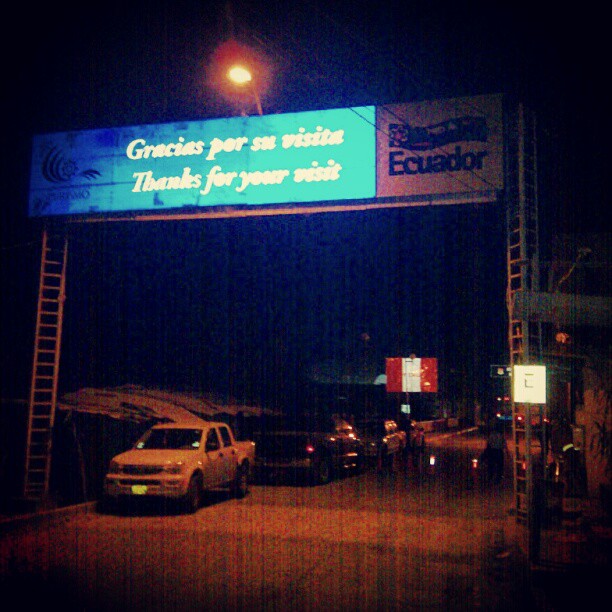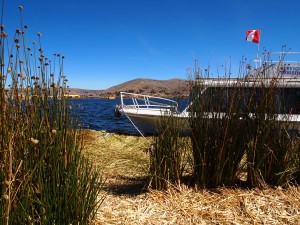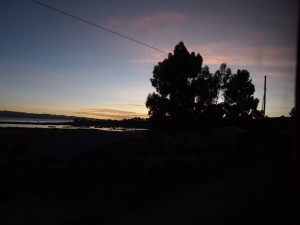One very interesting thing I forgot about South American culture and was reminded of today: People have absolutely zero concept of the personal bubble.
In lines for buses, customs, checking luggage, even buying groceries or walking on the sidewalk, people get so close to you it’s absurd. And I’m not talking about potential thieves trying to get at my purse. We’re talking little, pushy old ladies or mothers with children who just inch their way so close to you I find myself flinching.
That being said, my 15 and a half hours of bus rides from Loja, Ecuador into Chiclayo, Peru went without much of a hitch. After a painless hour ride from Vilcabama into Loja, I grabbed a ticket for my overnight bus and sat down next to a very sweet Australian girl who is spending a year traveling through Central and South America. We spent the hour and a half before the 11 PM bus we were both on chatting and learning about each others lives and travels. Around 10:20, a couple who had gone to McGill and was staying at the same hostel as my new Australian friend (small world!) in Vilcabamba showed up, so the four of us English-speakers decided to band together.
Because yesterday was a huge holiday in Ecuador and there was a large parade in Loja, they were running two overnight busses into Piura. The bus I was on was scheduled to depart at 11:06 (why, I really couldn’t tell you) and there was mass confusion about the number of the bus since half the peoples tickets said numero 05 and the other half said 80. Regardless, it all got sorted out and we were on our way by 11:15 or so, which, for all intensive purposes, is 11 PM Ecuadorian time. I had a rather gordo, although very nice, man sitting next to me who, again, didn’t quite understand the whole personal bubble thing and, as a result, had his elbow on top of me for part of the ride. I think the trick is to shove back juuust enough that the person figures out that just because I’m little doesn’t mean I don’t need my space. Regardless, I slept on and off, jolting awake everytime the bus would crawl across unpaved roads or stop suddenly to let people on and off. And yes, despite it being 2 AM, people were still getting on and off the bus. Direct buses are apparently non-existant in Ecuador.

My horrific, camera phone photo of the 4 AM border crossing — Thanks for visiting Ecuador in the foreground and the red and white striped Peruvian flag in the background!
At approximately 3:45 AM we arrived at the border. Everyone piled off the bus and waited in line to get their passport stamped out. Then, just like at the Peru/Bolivia border crossing, the bus drives up ahead and you walk the several hundred yards to the official country entrance, fill out your forms and get your passport stamped into Peru. Both border officials were very nice, understood my Spanish no problema and stamped my passport with very few questions asked. Despite taking 30 minutes total for all of us to get past the two customs desks, I felt completely safe the entire time, and it really was an incredibly easy process (especially compared to my nightmare at the Bolivian border!)
As we waited in line, we made friends with a very nice Peruvian man who was listening to music out-loud on his blackberry. At some point, a Toni Braxton song came on, and he proclaimed that she was his wife, laughing. We continued talking on and off as we waited. Little did we know this man would be our saving grace.
Lesson number one: Never cross into a country without at least a little bit of the right currency.
Lesson number two: Don’t assume that just because you’re on a bus you will be arriving at a central bus terminal where your next bus will be departing from.
I bet you can imagine where this is going. As the four of us piled off our respective busses and met to figure out where our busses to Chiclayo (for myself and the couple from McGill) and Trujillo (for the Australian girl whose name I can’t remember for the life of me — oops!) were leaving from, our new Peruvian friend informed us that, there is no main bus station in Piura. I’d been warned by several people that Piura is not a nice or particularly safe place, and to be especially careful with your bags when you’re leaving the bus station. The easy answer would have been to simply grab a cab, but none of us had Peruvian Soles. Major fail.
Thankfully, our amazingly nice Peruvian friend took the time to walk us several blocks away to an ATM and then to our respective new bus stations. When the ATM wouldn’t work for any of our cards, he happily traded us $20 US cash for 50 soles.
I will admit that he was definitely attempting to hit on me, and started saying that Toni Braxton was his wife but I would be his next wife. It was all in clean fun though, and he was so sweet and I never felt uncomfortable or creeped out. When he left, he told me I was beautiful and bien viajes (good travels). Such a wonderful reminder how how sweet and incredibly helpful people can be. I’m sure had he not been there we would have figured something out, but he made everything so painless, and we were all so thankful!We only had to wait 30 minutes for an 8:15 AM bus into Trujillo. Three hours later (I completely passed out for the entirety of the ride, thankfully) the three of us were in a cab on the way to a hostel. We showered, found a working ATM, got ourselves some lunch, then spent a few hours out and about in the city. After a long night of on and off sleep on the bus and an even longer day trying to keep myself awake, it’s time to pass out. I promise another blog post soon with my impressions of northern Peru and Chiclayo!


